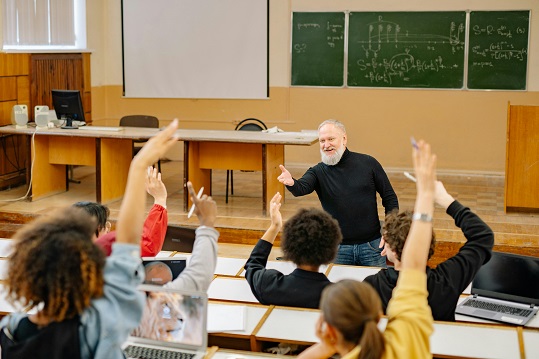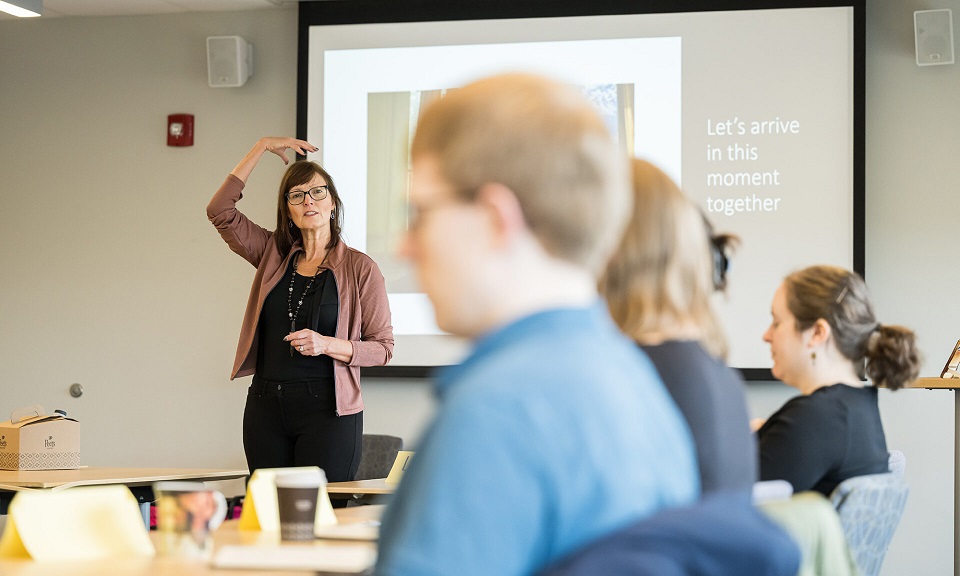

Mindful Professor Training Program
Overview
The Mindful University Project is offering a Mindful Professor Training for teaching faculty and course instructors at the University. This program is rooted in cutting-edge research and practices and aims to offer participants a variety of tools to access ways to return to calm, be present with themselves and others, utilize mindful leadership skills, enhance teaching effectiveness, as well as learn what actions they can take to support students’ well-being.
The Mindful Professor Training is offered once per semester and consists of nine workshops. It is open to University of Rochester faculty, course instructors, postdoctoral fellows, and PhD students with teaching responsibilities.
The Fall 2025 cohort will be held on Wednesdays from 9:30 – 10:30 AM at Saunders Research Building on the following dates: September 3rd, 10th, 17th, 24th, October 1st, 8th, 22nd, November 5th, and the graduation on November 12th.
Register for the Mindful Professor Training Program

Rationale
Since the COVID-19 pandemic, faculty and student-facing staff have been vital supports for students. In fact, according to a Healthy Minds Network study conducted in 2020, 80% of faculty and staff reported having conversations with students regarding their mental health, yet only 30% stated that they had received training on how to support student mental health. Of respondents, also 21% of them reported that supporting students in emotional distress had taken a toll on their own mental well-being1.
Research has found that stress and burnout can impact teaching in a variety of ways, including:
- Can hamper development of relationships and rapport with students
- Difficulties with providing academic and social supports for students, especially diverse student populations
- Providing less clear instruction
Can decrease one’s ability to create a safe and inclusive learning environment 2,3.
Participating in the Mindful Professor Program introduced me to a group of colleagues who shared similar values of presence, compassion, and intentionality. In a campus environment that is often overcrowded with meetings, exams, and extracurriculars, it was a gift to be able to gather on a weekly basis and reflect on how we want to show up for ourselves and our students.
Evidence-Based
Mindfulness can support leaders in being more fully present in the moment with what is going on in their inner and outer worlds, as well as be more thoughtful in their responses rather than operate with heightened habitual reactivity 4,5. In the classroom and with students, presence-based faculty and instructors are consistently self-aware, manage emotions under pressure with poise and confidence, understand the people they teach, recognize their impact on others, as well as lead with empathy and compassion6. Educators with these characteristics are more fully present, engender trust, and can increase their positive impact, personal resiliency, reduce stress and anxiety, and support academic flourishing in those that they teach7.
Substantial research has shown not only that mindfulness interventions for teachers can enhance their mental health and provide a more positive classroom environment, and also mindful leaders are deemed as more effective as a result of their ability to exhibit deep presence, self-awareness, emotional stability, and care and concern for the well-being and success of others6. However, limited research exists regarding the impact of mindful-based leadership programs in an academic environment8. While some studies are based in an academic setting with leaders, this is the first known study to investigate the impact of a mindfulness-based leadership program in an academic environment with University professors on faculty well-being, confidence in and comfort with supporting the well-being of students, as well as efforts to promote conditions for well-being in the classroom8.
Our Impact
The Mindful Professor Training program has been shown to significantly enhance faculty well-being and teaching efficacy in a recent wait-list controlled study published in the Journal of American College Health9. Faculty who participated in the program reported reduced stress and burnout, as well as increased mindfulness, self-compassion, and teaching self-efficacy compared to the control group. These findings highlight the program’s effectiveness in supporting both personal resilience and professional performance in higher education9.
Participation in our training would be extremely valuable both to inform a future larger-scale mindful leadership training at the University as well as help fill the gap in research in this field.
Having this diverse group of participants I was able to appreciate how to bring this in/these skills in to my personal life and professional life and I want to believe that since this wasn’t strictly medical school faculty or silo groups of faculty in different schools, this was really trying to bring together a ‘one university’ model was a strength and gave me insights about how I want to behave as an instructor, mentor, colleague.
What You Will Gain
In this transformative experience, you will be equipped with mindful leadership practices and education on supporting students’ mental well-being to assist you with being more fully present, engage in mindful communication, and create a mindful classroom environment to allow your students to thrive.
✔️ An opportunity to take your teaching to a new level of effectiveness, focus, calm, and clarity as well as improve your overall well-being!
✔️ Armed with new insights and hands-on practices, you will show up in new ways that will support student academic achievement and well-being
✔️ A Mindful Professor sticker to put on your office door!
✔️ A certificate of completion
✔️ Access to a community of mindful professors and monthly continuing education opportunities
Benefits for the Larger Community
✔️ Help to fill a gap in knowledge about how mindful leadership practices can impact faculty mindfulness, well-being, stress, self-compassion, compassion fatigue, and teaching practices, but also improve the well-being and academic flourishing of students.
✔️ Foster a culture of mindful presence on campus
✔️ Individual transformation that will have a spillover effect on students
✔️ Form the beginning of a slow professor movement at the University and allow the University to take meaningful action to better support professor well-being and create a healthier institution
I feel much more present for my students and patients now.
Questions?
Please direct any training related questions to:
Rebecca Block (rblock4@ur.rochester.edu)
Manager, Health Promotion Initiatives – Student Well-being, Health Promotion Office
Training Graduates
Since Fall 2023, we have had 52 graduates of the Mindful Professor Training Program! Join us in congratulating the individuals below.
Anu Ahmed, PhD (she/her)
Assistant Professor
Department of Anthropology
M. Cecilia Barone, PhD (she/her)
Assistant Director, Workshop Program
The Learning Center
Sara Bickweat Penner, MFA
Senior Lecturer, Resident Theatrical Intimacy Director
English Department, Theatre Program
Erin Black, PhD (she/her)
Assistant Professor
Department of Earth and Environmental Sciences
Emily Breitbart
Graduate Program Coordinator
Department of Chemistry
Nancy Chen, PhD (she/her)
Assistant Professor
Department of Biology
Emma Daitz
Senior Instructional Designer
Robin Frye, PhD (she/her)
Lecturer and Assistant Director, Coaching and Workshop Program
The Learning Center
Rachel Glade, PhD
Assistant Professor of Earth and Environmental Sciences
Assistant Professor of Mechanical Engineering
Department of Earth and Environmental Sciences
Daniel Gorman Jr.
Postdoctoral Associate
Department of History
Jonathan Holz, PhD (he/him)
Professor of Instruction
Department of Biology
Megan Lovely, MFA (she/her)
Program Manager, Community-Engaged Learning
Center for Community-Engaged Learning
Renee Miller, PhD
Professor, Brain and Cognitive Sciences, Instructional Track
Undergraduate Neuroscience Program4
Christina Schmidt
Tutoring Program Manager
The Learning Center
Kate Soules
Instructor & Dudley Doust Instructor
Eloise Stevens, MLIS, MEd (she/they)
Student Success Librarian
River Campus Libraries
Megan Tichy
Professor of Instruction
Department of Chemistry
Kyle Trenshaw, Ph.D. (he/they/any)
Assistant Director for STEM Education & Buddhist Chaplain
The Learning Center
James C. Wamsley, Ph.D. (he/him)
Adjunct Professor
Department of Linguistics
Solveiga Armoskaite, PhD
Assistant Professor
Department of Linguistics
Lindsay Baker, M.A. (she/her)
Instructor of Opera
Eastman School of Music
Lisa Jakelski
Academic Success Coach
Eastman School of Music
John Kapusta
Assistant Professor
Musicology Department
Charlotte Marcy
Instructor of French
Eastman School of Music
Rachel Roberts, EdD
Director, ESM Strategic Initiatives and Institute for Music Leadership
Assistant Professor of Music Leadership
Eastman School of Music
Chelsea Whittaker, D.M.A. (she/her)
Assistant Professor of Vocal Coaching
Eastman School of Music
Theresa Bingemann, M.D. (she/her)
Associate Professor of Pediatrics and Medicine
School of Medicine and Dentistry
Lauren DeCaporale-Ryan, Ph.D.
Associate Professor, Departments of Psychiatry, Medicine, and Surgery
School of Medicine and Dentistry
Andrew Dubina, M.D. (he/him)
Assistant Professor of Pediatric Orthopedics
School of Medicine and Dentistry
Audrey Jajosky, M.D., Ph.D. (she/her)
Assistant Professor, Department of Pathology and Laboratory Medicine
School of Medicine and Dentistry
Alexander Kuehl
Faculty, Neuroscience
School of Medicine and Dentistry
Zahira A. Quiñones Tavárez, M.D., M.P.H., M.S., Ph.D.
Research Assistant Professor, Department of Public Health Sciences
School of Medicine and Dentistry
Jennifer West, Ph.D. (she/her)
Associate Professor, Department of Psychiatry, Child & Adolescent Services
School of Medicine and Dentistry
Ann Marie White
Psychiatry Faculty
School of Medicine and Dentistry
Andrea Allen
Advancement Senior Director
School of Nursing
Toby Brown, Ph.D.
Senior Instructional Designer, Education Innovation Team
School of Nursing
Olivia Harrington
Academic Success & Enrichment Specialist
School of Nursing
Rebecca Red-Wolf, PhD (she/her)
Associate Professor of Clinical Nursing
School of Nursing
Craig Sellers, PhD, MS, RN, AGPCNP-BC, GNP-BC, FAANP (he/him)
Professor of Clinical Nursing & Professor of Medicine / Geriatrics and Aging
School of Nursing & School of Medicine and Dentistry
Donna Steo
Nurse Manager
Thom Shaw, MFA
Executive Professor of Leadership
Simon Business School
I have seen my students more willing to talk. I teach a language and the barriers to speak can be heavy. I think they see better that a mistake is a step stone to learning. I have share mindfulness practices and heard things like: ‘I so needed that’. Then there would be short pause/silence and everybody would engage in the activity.
Mindful Professor In the News
References
- Boston University School of Public Health, Mary Christie Foundation, the Healthy Minds Network, and Hazelden Betty Ford Foundation. (2021). (rep.). The Role of Faculty in Student Mental Health. Retrieved from https://marychristieinstitute.org/wp-content/uploads/2021/04/the-role-of-faculty-in-student-mental-health.pdf.
- Becker, E. S., Goetz, T., Morger, V., & Ranellucci, J. (2014). The importance of teachers’ emotions and instructional behavior for their students’ emotions – An experience sampling analysis. Teaching and Teacher Education, 43, 15– 26.
- Watts, J., & Robertson, N. (2011). Burnout in University Teaching Staff: A Systematic Literature Review. Educational Research, 53:1, 33-50.
- Brendel, W., Hankerson, S., Byun, S., & Cunningham, B. (2016). Cultivating leadership Dharma: Measuring the impact of mindfulness practice on creativity, resilience, tolerance for ambiguity, anxiety, and stress. Journal of Management Development, 35(8), 1056-1077.
- Lippincott, M. (2018). Deconstructing the relationship between mindfulness and leader effectiveness. Leadership & Organization Development Journal, 39(5), 650-664.
- Archuleta, K., Jennings, C. T. & Cunliff, E. (2019). Mindfulness at Metropolitan Universities. Meditation and Mindfulness in Adult Education, 2019(161), 33-43. https://doi.org/10.1002/ace.20309.
- Schwind, J. K., McCay, E.; Beanlands, H., Schindel, L., Martin, J., Binder, M. (2017). Mindfulness practice as a learning-teaching strategy in higher education: A qualitative exploratory pilot study. Nurse Education, Today, 50(1), 92-96.
- Lomas, T., Medina, J. C., Ivtzan, I., Rupprecht, S., Hart, R. & Eiroa-Orosa, F. J. (2017). The impact of mindfulness in well-being and performance in the workplace: An inclusive systematic review of the empirical literature. European Journal of Work and Organizational Psychology, 26(4), 492-513.
- Block, R., Critchley, L., Snell, A., Davie, C., & Manchester, R. (2025). The mindful professor: the impacts of an innovative mindfulness training intervention for college faculty. Journal of American College Health, 1–6. https://doi.org/10.1080/07448481.2025.2503835.


